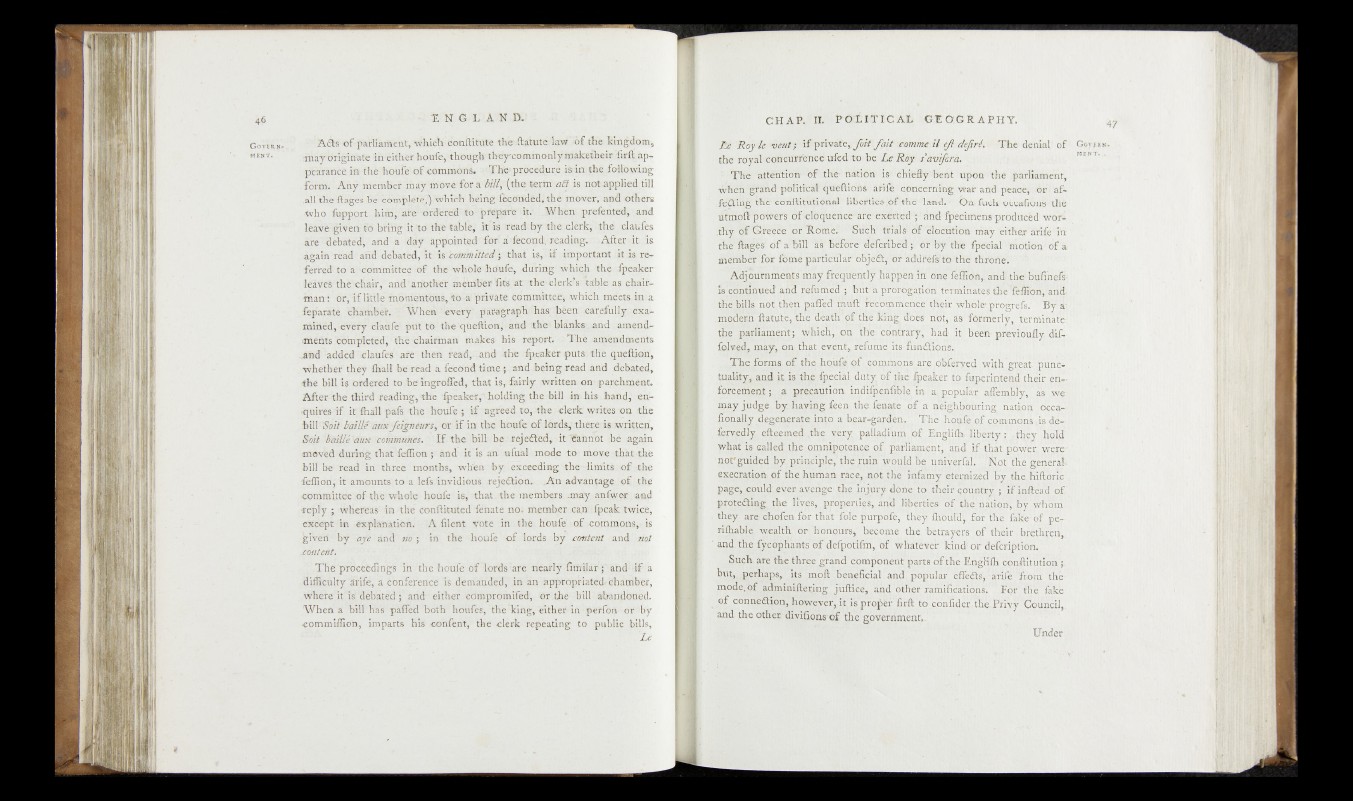
4 6 Tv N G L A N D .
G overn».
MENT. ..
i l l f i !
•' Aéts -ofparliament, Whiéh GoftftiWte the’Aatuté law of the kingdom,
m ay originate in either houfe, 'th'©ngfrtlmycDmmonIymake&eirjfh%ap-
pearance in1 fhe-houftf-ef commofas. t^^Thhi procedure ihin theibiknaang
-form. Any irremher'may move fo r a '&//p'(the term a£i is nat-appMedtfl
all the ftages be complete,) which, being leconded, the mover, atlfi*-others
who fupport hrm, arb‘1öraere^ifo*-|)fe‘plTfé it.- When prefentte’d^,> and
leave given té bring it ’to the fable, it’l s «Sad-Ty the clerk, th e .claCfes
are' debated, .and1 a 1 dhy - appointed for a is
again'read ’arid debated,'it is ‘committed; th a t is»1 if -importantihhh referred
to a -committee-of the whole hdufé, .during which th£ fpeaker
leaves the chair, and'another mikrfb'er’fife at the elerk’s’rafble-aa chaib-
irian: or, i f little mohiehtbus, Vo private commi ttee, which meets in a
Separate chamber. When every pa-ragrapli, has bëen carefully examined,
every cla-afe" p e t to * the ■-qhéfti©-it,,*‘"and "tthfe'! blanks, arid amend-
(merits uohvpleted, thé chairman makes his répört. -T h é amfendmemts
.and-added 'ekufes' -^fe then read^-ahd ttbe üpt^aken putsatê^queftioh',
•whether they fhall be read a fefcond time ; arid ,bfiing,aread arid debated,
•the bill is ordered töjftétogroffed, th a t is» ifetitiy written- o n - parchment.
After- the third reading, th e fpeaker,'1 holding the bill in his hand, en-
.■quires -if it fhall pafs the houfe ; if agreed to, th e -clerk writes on the
hill ''Soit baïUé atixJ'eignèurs, or if in the houfe of lords; there is written,
Soit ta illé ‘'aux communes. I f the bill be rejected, it 'caimbt :bê again
moved during that feffion ; and it is .an ufual mode to - move t-hb^tke
■bill be read "m Three months, when b y exceeding 't h e rm i t s aofljthe
■feffion, it amountstp a lefs invidious re je c tio n ., .An advantage of the
committee of the whole houfe is, that th e members .may anfwer and
-reply ; whereas in the conftituted feiiate no, member can- fpeak twice,
except in explanation. A .filent vote in the houfe • of commons, is
•given by aye and no ; in the -houfe o f lords by content and , ?io.t
^content.
/ The proceedings in the houfe o f lórds a re •nearly fimilar and if a
difficulty irife, a conference is demanded, in an .appropriated- 'chamber,
where Tibi's ’debated ; an d ' either compromised, or .thé bill abandoned.
'When a bill bas paffèd both houfes, the king, either i n 1 perfon or by
•eommiffioh, imparts his .confent, the clerk repeating to public bills,
WÊÈ
___
C H A P , II. P O L I T I C A L GE O .G R A P IIY . 4?
jLe Roy le v eu l; if privat'£vfo kif(n txm m Tm d l eJkdeJirt,- .-The denial- o f ; GeyfRH-
th e royahcondurrence ufedrto be Le Royi ^akiifina. ;>
*?He I ,,a]Et§nfibri*4'i‘bf“, the• nation»'i^'chi’efify betiT tfpott the parliament,
wheri-^faind peSMca’l’ quefti-ons atife ipricetnirig war arid peace; or - af-
fedting the' conllitutional lihertica'of the land.-- On fuch occafions the
utmoft powers of -eloquence arc exerted“; and' fpecimens produced woipl
.thy'of'OredSe or!'R6taey‘/^ h h J'tfi'aisl'of'dlo£M'0n ‘may either afife irt
the2 «ages' of'a tall w before' dumbed ; d t b f the Ipdcial motion' of a .
meiribdf for fome p a raw!aifb dj !ad d refs( fe'f Kh t-h r6ri'C 11
Adjournments niay frequently happen in- one feffion, an d the bufinefs.
is continued; and refumed ; but a prorogation't muriates; the feffion, and-
the bills not then paffed jnuft fecommenee their whole-pro u efs ? By a-
modem ftatute, the death of the king does not, as formerly, terminate 1 ‘
the parliament; w nien,, on tHmgbntrary, h a d 'H been- previouHy’dif^
folved, may, on that event, refume its functions.
The forms o f the ho.iife of commons are obferyed with great punctuality,
and it is the fpecial duty; of the fpeaker to fuperintend their en?-
forcement; a precaution- indifpeMble in a popular afifembiy, as we
may judge by having feen the fenate o f a neighbouring nation occa-
fionally degenerate into a bear-garden. The Jioufe'.of commons ,,is de-
ffirvedly efteemed the very palladium of Engliffi. liberty : they ' hold'
what is called the omnipotence o f parliament, and if - that power, were-
not"guided by principle, the ruin Would be universal. iSfot the general-
execration o f the human race, not the infamy eternized by the hiftoric
page, could ever, avenge the injury done to their country ; if in lfe'cloT
protedling the lives, properties, and liberties o f'th e nation, by whom
they are chofen for that foie purpofe, they ffiould, for the fake of pe-
rlffiable wealth or 'honours^'' .hecoriie the betrayers of their brethren,,'
ana the fycoph^nts*of defpbtqm, of' whatever fend4 Or description.' '
,Such are the three ?'rand component"parts of the Epghffi'cqr^itution
hn^,4 perhaps, its ,,mptt beneficial I a h a ' populaf arue T rem "t^e
ipode^of?mtmniftenngi imped, Aand otlrcPramjh1® t o E § ^ |® 'e - 'f a k .e
and- the othefi divifions*of the government..
Under